The Hermit of Turkey Hill is a story based upon a friendship, of sorts, that my grandfather -- Charlie Milroy -- had with a man who was the gentler sort of sociopath. The man lived in Ludlow for 35 years or so and spoke so few words that people weren't sure where he was from. I changed the name of the town, changed the name of the police chief -- my grandfather, and made up a number of characters and little events to flesh out the few facts I knew about this story. Those few facts were the important ones, but good narratives are not made up of only the important events. The little details, which may be in the background, are necessary to make the narrative concrete.
Excerpt:
After wiping the sweat from his forehead, Charley MacGregor looked at his sister and asked, “Why do you do all that ironing when it’s so hot out, Helen?”
The twelve year-old boy was sitting at the kitchen table, his forearms resting upon the table, his chin resting upon those forearms. Helen looked down upon her half-brother nearly fifteen years younger than her. She smiled and then reached down for the small towel hanging from her apron strap. After she wiped some of the sweat from her forehead and her cheeks and her throat, she told him, “It’s got to be done, and I have to cook dinner later and then do the dishes and then the darning has to be done. You poke holes in your socks faster than anybody in town.”
He shrugged, not in the mood to be teased, not even by the half-sister who’d been more his mother than a sibling, his own mother having died when he was only six, days after the birth of his youngest sister, Margaret.
“Why don’t you grab your fishing pole and head up to one of the ponds, Charley?”
“Fishing would be no good in this heat.”
“By the time the heat calms down, Father will be home and he’ll have you out weeding and pruning in the garden.”
No more than a shrug came from the lad who’d already weeded the vegetable garden two nights before and had even taken all the suckers off the young tomato plants. It would take only minutes to pull any weeds that had popped up in the meantime though the suckers seemed to grow awfully fast on their dozen tomato plants. “Anyway,” he informed his sister in his finest lecturing voice, “late-night fishing or early morning fishing is best when the summer heat is on us. The water stays hot through the evening.”
“You promised me a load of those ugly fishes with the sweet white meat.” “Bullheads. They’re more likely to bite at night.”
“And Father is not likely to let you head up fishing in the middle of the night. And, if he did, the constable might grab hold of you and bring you right back. Twelve year-olds belong in bed at that time.”
Charley was staring at his sister, thinking she looked a lot like both Helen’s mother and his own mother, sisters and not the same woman. Helen was his cousin as well as his sister, his father having married his sister-in-law after his first wife had died. That was the reason for William MacGregor’s move to the New World, a move that had occurred more than ten years before the influx of Scottish immigrants, mostly experienced textile workers who were brought to the United States by the Jenckesville Mill Company. Some of those later immigrants had been loaned the money for the trip, some had merely been provided with letters saying they had jobs ready—such letters making it easier, sometimes simply making it possible, to get through Ellis Island instead of being put back on the ship to return to the Old Country. William MacGregor had been a prosperous skilled worker, a tinsmith, and had not needed a subsidy to move to the New World; in fact, he had bought a house shortly after settling in Jenckesville. And he’d had a choice of several jobs, working for the mill company only because it was convenient; they had also offered him a bit more money than any other metal-worker in the mills.
It had been Helen who had once explained to her young brother: by Scottish law, a man could not marry the sister of his dead wife. And so, Mr MacGregor had come to the United States, bringing his daughter from that first marriage which had proven to be so short. In those days, it had been easy for a respectable man to get through Ellis Island, so long as he was not actually indigent or obviously ill. And so long as he was from England or Scotland or Wales. Helen had said the authorities assumed such a man was coming to the country to take advantage of the nearly boundless opportunities. It had taken him only a year or so to establish himself in the New World, at which time, his once and future mother-in-law came over, bringing her younger daughter.






